NAM Election Playbook: Synergies, Not Sides
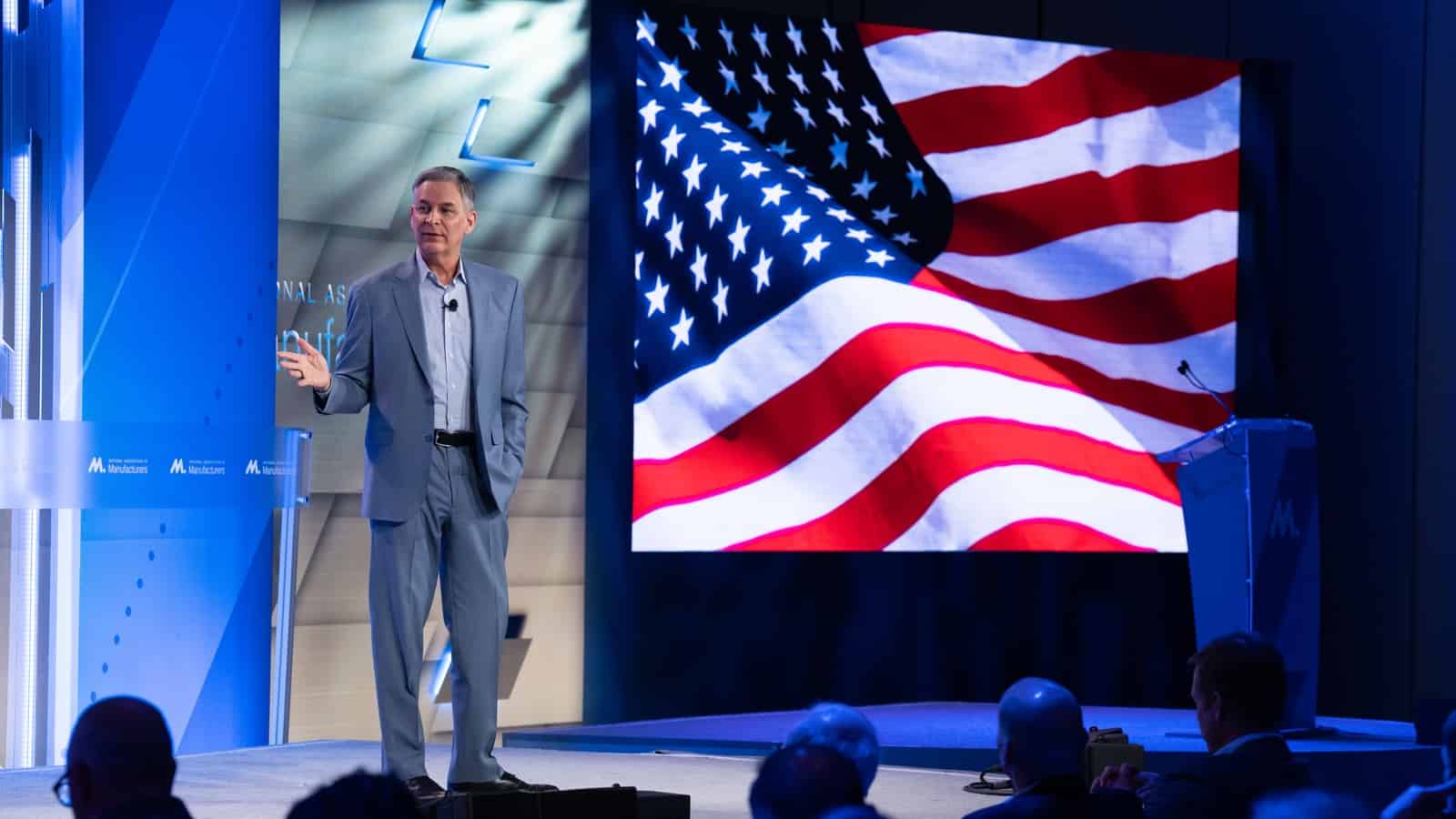
The NAM isn’t playing favorites in an election year. Instead, it’s redoubling its post-partisan approach to advocacy. NAM President and CEO Jay Timmons’ message to manufacturers: the association will leverage its hard-won, bipartisan influence to advance manufacturers’ priorities, no matter who’s in charge.
- “That’s what we’re about. Policy that helps people. Policy—not politics, personality or process. That’s what will guide us in 2024 and beyond,” Timmons said in a speech that helped kick off the NAM board meeting this week, before more than 200 of manufacturing’s leading executives in Phoenix, Arizona.
Why it’s important: “Both sides want us on their side,” Timmons emphasized while recounting a recent legislative debate. That trust and respect, he said, translates into wins: agencies modifying rules to avoid lawsuits and high-level White House officials acknowledging the impact of NAM campaigns.
Battles loom: But the very system enabling these victories is under threat, Timmons warned, placing the onus on manufacturers to not just build products, but to empower the NAM to utilize their voices and stories to advance policies that strengthen the economy and underpin democracy and free enterprise.
- Tax showdown: Any new taxes on manufacturers are a nonstarter, Timmons vowed, staking a claim in the looming 2025 tax fight and reiterating manufacturers’ call for immediate passage in the Senate of full capital expensing, R&D expensing and interest deductibility.
- Regulatory onslaught: From new Environmental Protection Agency air standards to the broader regulatory agenda, Timmons argued that overzealous rules impede manufacturing competitiveness. He specifically criticized the new PM2.5 standards, saying the EPA “set them at a level that is lower than the EU or the UK, and imposed a compliance timeline that is far more aggressive.”
- LNG halt: Timmons blasted the Biden administration’s liquefied natural gas export permit freeze, calling it shortsighted and detrimental to both manufacturers and broader U.S. energy and climate goals. “They want to address climate change?” he asked. “So they’re going to have other countries buying and burning dirtier energy? They want to support our allies around the world? So they’re going to force Europe and Japan and others to get their fuel from the likes of Russia?”
- Immigration deadlock: He criticized inaction on both sides of the aisle, saying border security and workforce solutions can—and must—coexist.
Opportunity ahead: Despite considerable challenges, Timmons sees an opportunity for manufacturers to take the lead in promoting American values and sound policies that fuel the industry’s strength.
- “This election year, manufacturers can help renew a shared sense of purpose,” Timmons told executives. “Remind Americans why our country—our system rooted in God-given human rights and fundamental freedom—is worth celebrating and defending.” At stake is not just the next regulatory win, but the very system that made U.S. manufacturing a global powerhouse, he said.
- America’s bicentennial celebration helped us see beyond the divisions of the day, Timmons observed. As we approach the 250th anniversary of the signing of the Declaration of Independence, “it’s manufacturers who are positioned to cultivate that patriotic spirit,” Timmons said. It’s more than just bottom lines. “We can help mend the divides—so that we can promote policy that will strengthen manufacturing in America.”
WTO Meeting Kicks Off to Challenges; “Big Deals Unlikely”
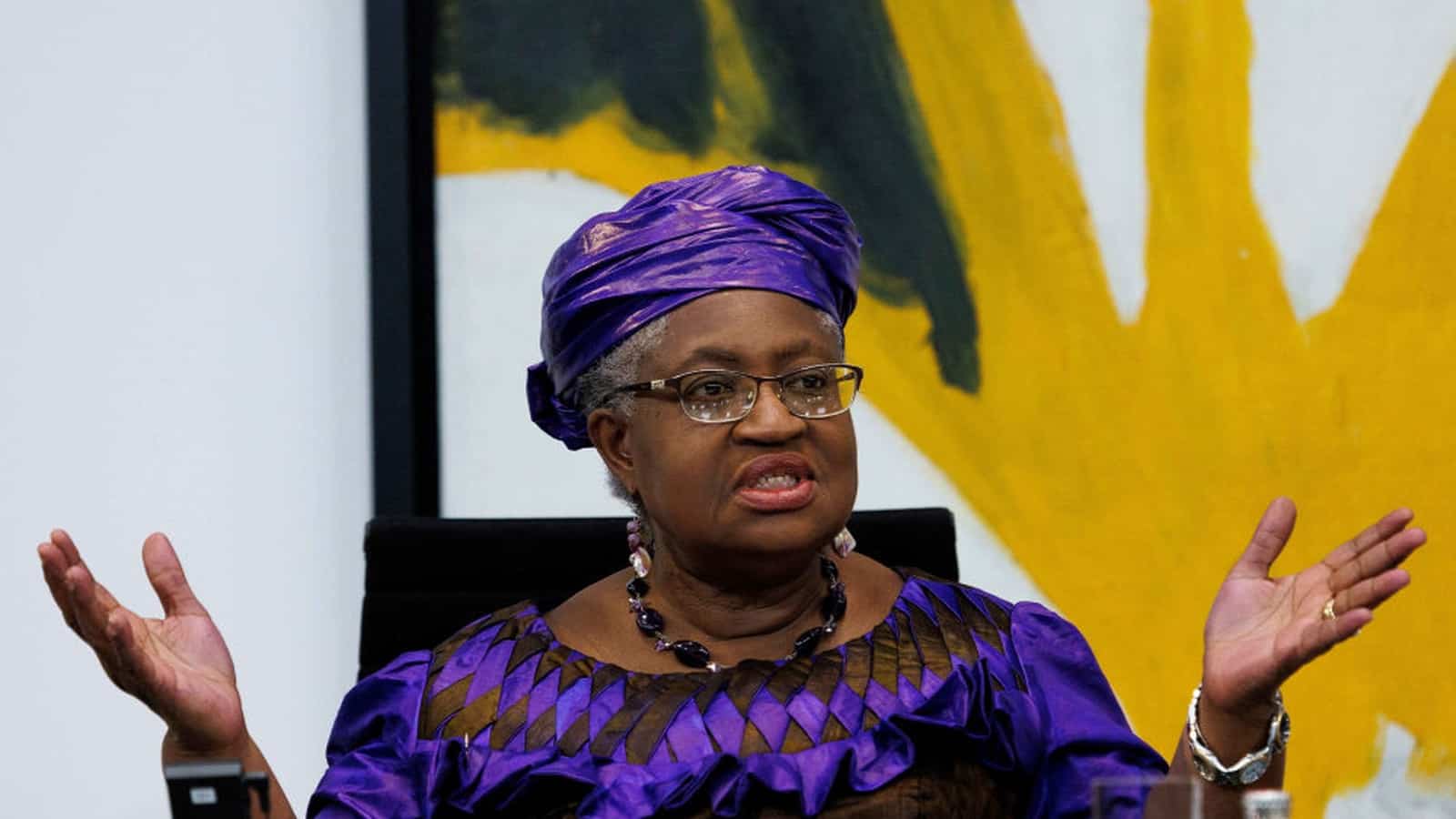
With economic challenges and “geopolitical tensions” threatening international commerce, the World Trade Organization faces a difficult job at the 13th Ministerial Conference, according to AFP.
What’s going on: At the meeting, which began Monday in Abu Dhabi and is expected to conclude on Thursday, “[t]he WTO is hoping for progress, particularly on fishing, agriculture and electronic commerce. But big deals are unlikely as the body’s rules require full consensus among all 164 member states—a tall order in the current climate.”
- The organization could also decide on whether to expand a 2022 TRIPS waiver to include COVID-19 therapies—a move that would be damaging to manufacturing in the U.S.
- “The WTO committee in charge of discussing intellectual property rights recently told the WTO General Council that it had been unable to reach agreement on the issue after more than 18 months of discussion,” POLITICO reports. “That could signal the end of the road for efforts to expand the waiver, but [there is] fear it could still be approved by ministers at MC13 as part of the final horse-trading that occurs to reach some deal.”
Reform needed: “Speaking on the first day of MC13, WTO Director-General said that ‘multilateralism is under attack,’ highlighting a need to ‘reform the multilateral trading system’ and boost international cooperation,” according to AFP.
- European Trade Commissioner Valdis Dombrovskis echoed the call for reform, saying, “The world has changed. And institutions like the WTO need to evolve too. We are faced with crises wherever we look.”
No waiver expansion: One change that should not take place, however, is the TRIPS waiver expansion, the NAM told U.S. lawmakers ahead of the WTO meeting. NAM President and CEO Jay Timmons met with Okonjo-Iweala and WTO Deputy Director General Angela Ellard in Geneva last March to discuss the waiver.
- “The proposed expansion of the TRIPS waiver to include diagnostics and therapeutics would jeopardize American innovation, endanger U.S. jobs, undermine future investment and research and development for lifesaving products that are fundamental to fighting global crises, including many diseases and health conditions other than COVID-19, and pose serious safety concerns,” the NAM and six association partners told Secretary of State Antony Blinken, Commerce Secretary Gina Raimondo, U.S. Trade Representative Katherine Tai and White House Chief of Staff Jeffrey Zients last week.
Digital commerce: There are some concrete actions that should be taken regarding the WTO, the NAM told the House Ways and Means Subcommittee on Trade this month.
- The USTR should reverse a decision it made in October 2023 to “drop the longstanding digital trade position of the U.S. at the WTO. This longstanding position, which has clear bipartisan support from the U.S. Congress, seeks to protect cross-border data flows, prohibit costly data localization requirements abroad, defend American digital products from discrimination and protect American IP.”
- And the U.S. should urge the WTO to institute a permanent e-commerce moratorium. Allowing the current “moratorium on customs duties for electronic transmissions … to expire would inject uncertainty and impose unfair burdens on manufacturers in the U.S.”
The last word: “The WTO remains a critical forum to advance free and fair trade globally,” said NAM Director of International Policy Dylan Clement.
- “The outcome of the 13th WTO Ministerial Conference is important because an expansion to the TRIPS waiver or letting the e-commerce moratorium expire could significantly harm manufacturers in the United States. As such, manufacturers will be watching the WTO Ministerial this week very closely.”
Arizona: Manufacturing’s Crossroads
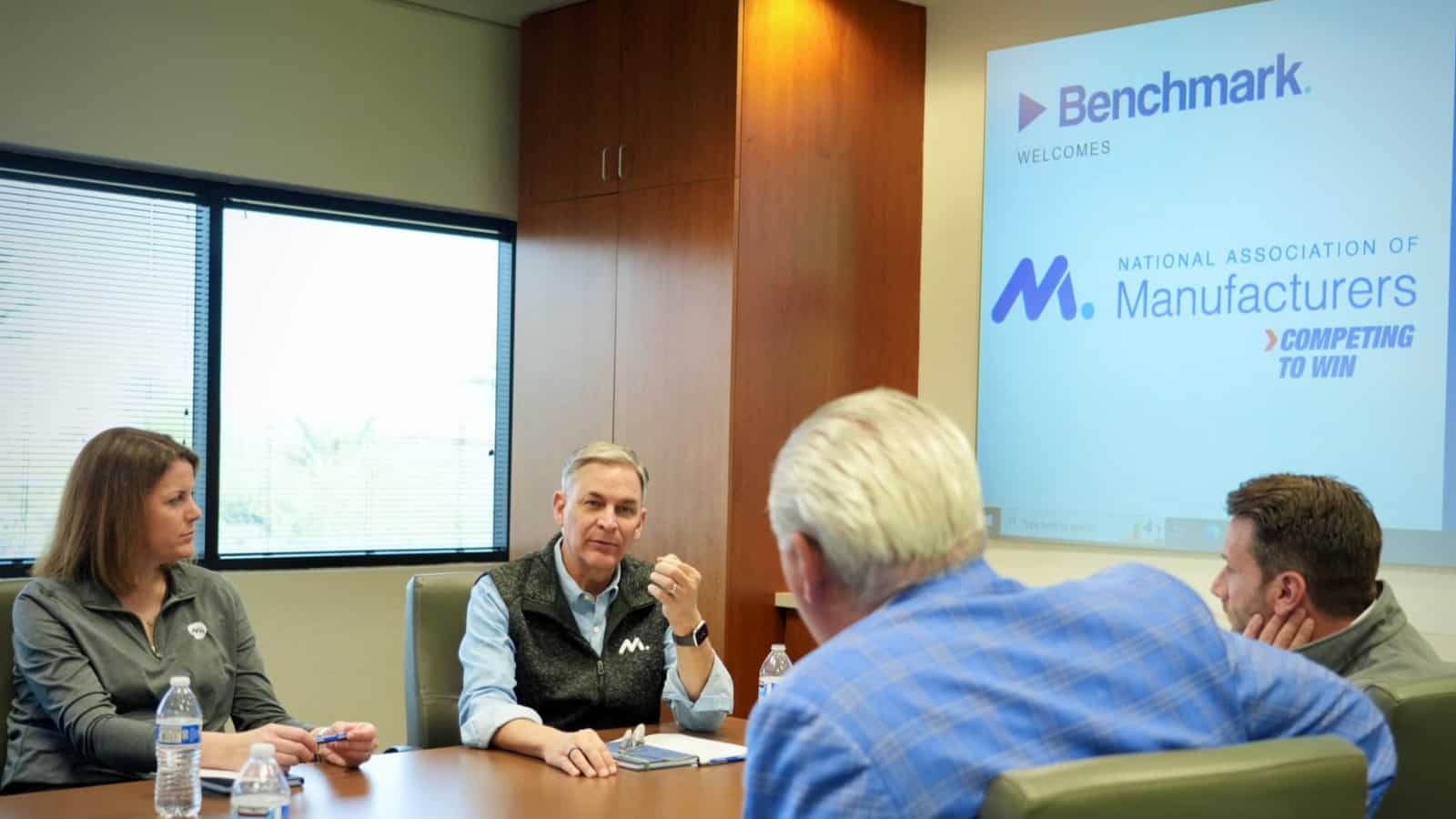
In the heat of Arizona’s “Silicon Desert” and surrounding communities, the future of America’s global competitiveness and climate goals aren’t just being forged—they also hang in the balance.
Last week for the first time in 2024, the NAM brought its Competing to Win Tour to Arizona, and that stark contrast between the status quo and the probable future was on display in Phoenix at global semiconductor equipment manufacturer Benchmark and small manufacturer Valley Forge & Bolt and at Resolution Copper in Superior.
- NAM President and CEO Jay Timmons, Manufacturing Institute President and Executive Director Carolyn Lee—who leads the NAM’s 501(c)3 workforce development and education affiliate—and Arizona Chamber of Commerce & Industry President and CEO Danny Seiden met with local manufacturers to gain their perspective and insights.
Why it matters: The Biden administration and Congress have secured key measures to bolster manufacturing in the U.S., including the NAM-championed CHIPS and Science Act and tax credits in the Inflation Reduction Act to manufacturers investing in advanced production and energy projects. But raw material, workforce and tax and regulatory policy challenges threaten to undermine policy aspirations.
Silicon Desert expansion: With the CHIPS and Science Act poised to transform the sector, Benchmark President and CEO Jeff Benck and Executive Vice President and Chief Operating Officer Dave Valkanoff led the tour of their state-of-the-art Phoenix facility.
- In a good spot: Benchmark is well-positioned for the coming growth in semiconductor equipment demand. It is focused on securing its workforce and navigating a complex regulatory landscape to maximize the opportunity.
- Workforce woes: Even with the NAM and the MI’s Benchmark-supported Creators Wanted campaign boosting the industry’s image and the MI’s FAME initiative training thousands of technicians, finding skilled labor remains the top challenge. Benchmark advances earn-and-learn programs and partnerships with Arizona State University and community colleges to help fill the pipeline, actions that, according to Lee, “can help change the game.”
- Red tape delays: Regulatory hurdles pose obstacles. Benchmark seeks streamlined permitting and sensible rules to maintain their global edge.
- Bullish outlook: Benck is optimistic about the future of U.S. manufacturing and semiconductor demand. Investments in people and technology position the company well to deliver the next generation of innovation.

Taxes and immigration: The NAM’s return visit to Valley Forge & Bolt, after a stop last year with Sen. Kyrsten Sinema (I-AZ), shone a spotlight on the real-world impact of stalled tax policy and the urgent need for reform.
- Valley Forge & Bolt saw record sales in 2023 thanks to 2017 tax reforms boosting its equipment upgrades. Now, with provisions like full capital investment expensing stalled in Congress, orders have slowed.
- CEO Michele Clarke and COO Bret Halley made the case for R&D expensing, interest deductibility and a return to full capital investment expensing. Without these, they said, job growth and America’s manufacturing competitive edge are at risk.
- Skilled workers needed: Despite its success, Valley Forge says finding skilled workers is a constant struggle. Immigration reform is a must to secure the right talent pipeline, said Clarke. “Did you notice our engineers? Most of them are under 30 because we’re snatching them right out of college,” added Clarke. “The engineering talent in this country is dwindling, and we’re not authorizing enough green cards. I, myself, was a green card holder before I became a citizen.”

Policy roadblocks: The NAM’s visit to Rio Tinto’s Resolution Copper site highlighted the urgency of permitting reform in the face of critical mineral needs.
- Copper’s critical role: Copper is essential for clean energy. Electric vehicles, solar power grids and wind turbines all demand huge quantities. Yet, the U.S. remains heavily reliant on imported copper, jeopardizing progress.
- Massive potential: The domestic solution lies within the stalled Resolution Copper mine. With its potential to supply 25% of U.S. copper demand, it’s poised to be a key piece of the puzzle.
- Project in limbo: Despite a 350-strong workforce modernizing and maintaining the mine, permitting delays stifle the project’s full impact.
- Sustainable practices: “Resolution Copper is the future of eco-conscious mining,” said NAM Managing Vice President of Brand Strategy Chrys Kefalas, who toured the site. “Their team innovates sustainable practices, leads in water conservation and even supplies 7 billion gallons of water to Arizona farms. And what is more, it isn’t just the facts of the matter or what you saw that drives this point home, but the people who have worked on the site for years make all that clear with the pride they have about the project and their determination to see Resolution Copper through to making lives better for everyone.”
- Jobs and growth: Led by President and General Manager Vicky Peacey, the project promises to contribute $1 billion annually to the economy and more than 1,500 Arizona jobs. “This is about people, jobs and supply chains; and it’s also about realizing clean energy ambitions at the speed and scale that climate goals demand,” said Kefalas.

The bottom line: “The future of U.S. manufacturing might hinge on these contrasting stories. Are we a nation that champions innovation, attracts and keeps the brightest here, supports our manufacturers and tackles climate goals with homegrown solutions, or one that stalls progress in its own backyard,” said Timmons.
- “Arizona is at the epicenter of American manufacturing’s next chapter, and with smart policies and fewer unforced errors at the federal level, we can clear the runway for growth,” added Seiden.
Manufacturing Leaders: Congress Must Act Now
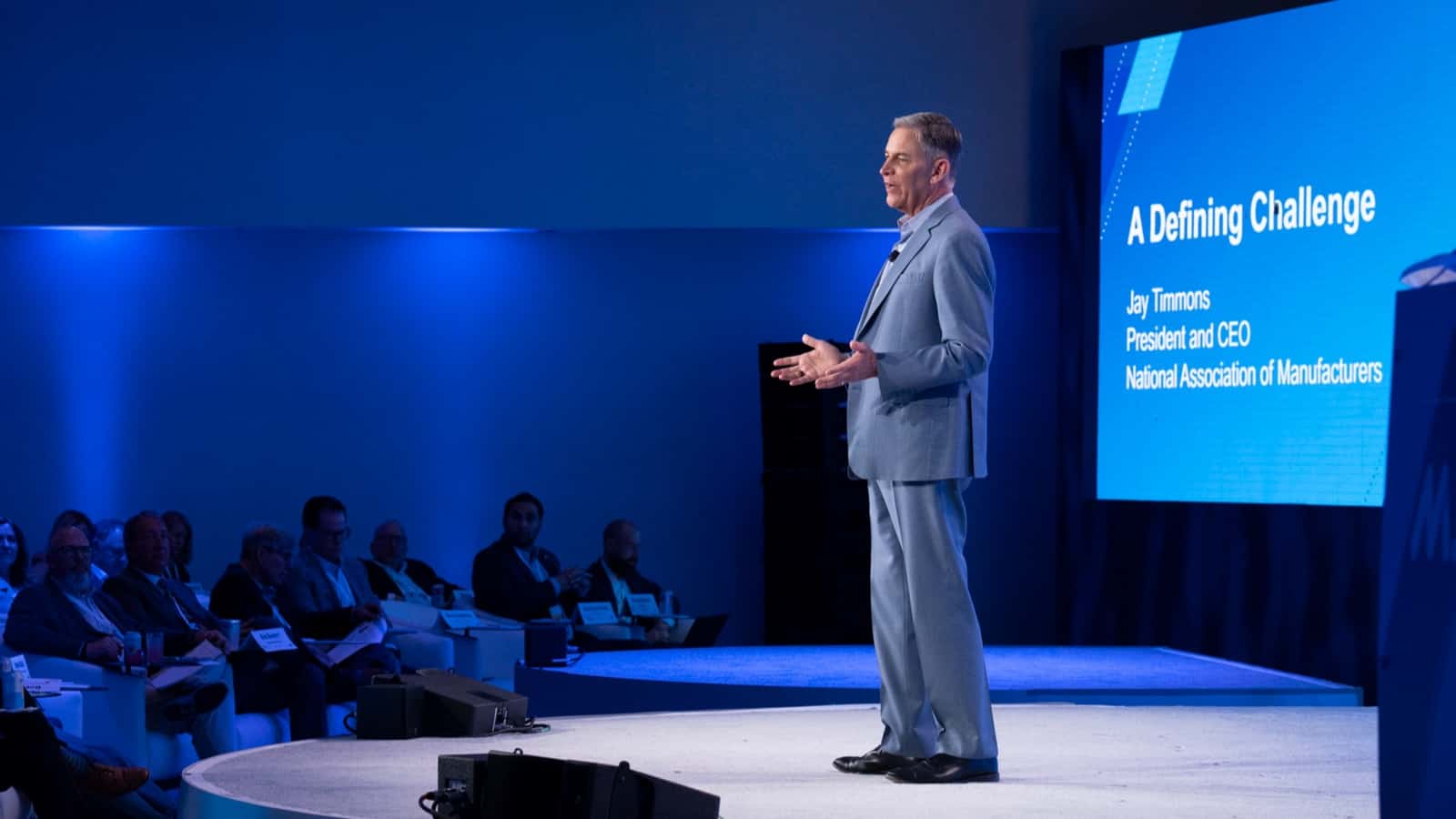
It’s imperative for the strength of not only manufacturing in the U.S. but democracy worldwide that Congress move now to advance a security package and government funding, said NAM President and CEO Jay Timmons, Johnson & Johnson Executive Vice President and Chief Technical Operations & Risk Officer and NAM Board Chair Kathy Wengel and Rockwell Automation Chairman and CEO and NAM Board Vice Chair Blake Moret on Monday.
What’s going on: “For the strength of our democracy here at home and the protection of democracy around the world, manufacturers are calling on Congress and President Biden to act swiftly to keep the government open, pass pro-growth tax provisions, secure our border and approve urgently needed aid for Ukraine,” the three manufacturing leaders told Congress ahead of Biden’s meeting with congressional leaders.
Why it’s important: In March 2022, shortly after Russia’s invasion of Ukraine, the NAM Board passed a unanimous resolution condemning the act and expressing solidarity with the Ukrainian people in their fight for independence.
- In February 2023, Ukrainian President Volodymyr Zelenskyy spoke to the NAM Board in a speech to the American business community. “We will prove that democracy is stronger than tyranny,” Zelenskyy said in that address. “When Russia loses, we will prove that terrorist states cannot overcome the power of a united democratic world.”
What should be done: Timmons, Wengel and Moret hammered home the criticality of swift action by Congress.
- “With time running short, manufacturers are looking to our leaders to act. They can address all of these priorities. In fact, they must address them all—for the future of our industry, the security of our country and the defense of democracy.”
GlobalFoundries to Get $1.5 Billion in CHIPS Funding

Semiconductor maker GlobalFoundries Inc. will be the first recipient of funding under the NAM-supported 2022 CHIPS and Science Act, CNBC reports.
What’s going on: “The U.S. government is awarding $1.5 billion to GlobalFoundries to subsidize semiconductor production, the first major award from a $39 billion fund approved by Congress in 2022 to bolster domestic chip production.”
- The Malta, New York–based GlobalFoundries—the largest U.S. manufacturer of customized semiconductors and the world’s third-biggest chipmaker—plans to use the funds to build a new chip-production facility in its hometown and expand existing facilities there and in Burlington, Vermont.
- The Malta facility will manufacture high-value semiconductors not currently produced in the U.S., Commerce Secretary Gina Raimondo said.
- In addition to the grant, the federal government is also offering GlobalFoundries $1.6 billion in loans.
Why it’s important: “The chips that GlobalFoundries will make in these new facilities are essential chips to our national security,” Raimondo said on Sunday, adding that the “agency is in active talks with numerous applicants and expects to make several announcements by the end of March.”
- In January, Commerce announced it was awarding defense contractor BAE Systems $35 million under the CHIPS Act.
Our role: The NAM—which helped secure several manufacturing priorities in the final CHIPS Act legislation—welcomed the news.
- “Congratulations to [GlobalFoundries]!” the NAM wrote in a social post Monday. “The NAM-championed CHIPS and Science Act is strengthening manufacturing in the U.S. We will continue to work with Congress and the White House to enact permitting reforms that will help speed the construction of these vital projects.”
U.S. “Very Concerned” About Critical Minerals

The Biden administration is “very concerned” about U.S. reliance on China for critical minerals, U.S. Energy Secretary Jennifer Granholm said Wednesday, according to CNBC.
What’s going on: China’s dominance in the world’s critical minerals supply chain is “one of the pieces of the supply chain that we’re very concerned about in the United States,” Granholm told the news outlet on the sidelines of the International Energy Agency’s 2024 Ministerial Meeting in Paris.
- China produces approximately 60% of all rare earth elements, which are critical to alternative-energy technologies, such as electric vehicles.
Why it’s important: “As part of a rapid uptick in demand for critical minerals, the IEA has warned that today’s supply falls short of what is needed to transform the energy sector,” according to the article.
What the administration is doing: Both production and processing of critical minerals “have to be addressed,” Granholm said.
- “And that’s why we are working very closely to ensure that we have identified which raw materials [or] critical minerals we need to be able to do our transition to a clean energy economy.”
The NAM says: “Other countries are taking all possible measures to develop domestic sources of critical minerals, and it should be a wake-up call to the U.S. that we need to be doing the same,” said NAM Vice President of Domestic Policy Brandon Farris. “We also need to reform our broken permitting system to get these projects operational as soon as possible.”
Manufacturers: New EPA Rule Directly Undermines President’s Manufacturing Agenda
Washington, D.C. – Following the decision by the Environmental Protection Agency to lower the National Ambient Air Quality Standards for fine particulate matter (PM2.5) to 9 micrograms per cubic meter, National Association of Manufacturers President and CEO Jay Timmons released the following statement:
“The Biden administration’s new PM2.5 standard takes direct aim at manufacturing investment and job creation, in direct contradiction to the president’s stated goal of strengthening manufacturing in communities all across America.
“The new standard of 9 and the EPA’s paltry 60-day implementation window will guarantee projects currently under permitting review will have to comply with this onerous decision, making an already gridlocked permitting system further gridlocked.
“Manufacturers in America will also be hard pressed to make long-term investment plans domestically as our global competitors have set more reasonable goals. The EU standard is currently 25, and a proposal there would be to reach 10 by 2030. The UK has a target of 10 by 2040.
“Governors and mayors will now have to make difficult decisions under this untenable standard. New manufacturing investments envisioned by the CHIPS and Science Act, the Bipartisan Infrastructure Law and the energy provisions of the Inflation Reduction Act will be subject to these new requirements. This revised standard will force some communities to choose which—if any—investments can proceed without running afoul of the EPA’s decree.
“By implementing such a radical standard here, our country is ceding our competitive advantage with an unforced error. All of these choices could have been avoided with a more sensible standard and a longer implementation runway.
“The EPA itself says that some 70% of particulate matter comes from nonmanufacturing sources, such as wildfires (29%), agriculture and prescribed fires (15%), crop and livestock dust (12%), unpaved road dust (10%), paved road dust (3%) and “dust” (2%). Before forcing actions that will curtail manufacturing investment and infrastructure development, the federal government should first determine how to deal with what is occurring naturally.
“To be sure, manufacturers proudly stood up for funding in the Bipartisan Infrastructure Law, CHIPS and Science Act investments and many of the policy provisions outlined in the IRA. But there is no doubt that our country will be unable to realize the benefits of these legislative accomplishments with this new rule in place. As counties and cities find themselves in nonattainment, this grave mistake will drive investment away from the United States, derail permitting and weaken the economy for all.
“The U.S. already has some of the strictest air standards in the world, and thanks to manufacturers’ innovation and leadership, some of the cleanest air and best environmental records. Manufacturers will consider all options to reverse this harmful and unnecessary standard, because it is our duty to stand against policies that hold our country back.”
Background:
Per the EPA: Nonattainment is any area that does not meet (or that contributes to ambient air quality in a nearby area that does not meet) the national primary or secondary ambient air quality standard for NAAQS.
The EPA recently reported that PM2.5 concentrations have declined by 42% since 2000, driven by major emissions reductions from both mobile sources and the power sector. As a result, America’s air is cleaner than ever.
-NAM-
The National Association of Manufacturers is the largest manufacturing association in the United States, representing small and large manufacturers in every industrial sector and in all 50 states. Manufacturing employs nearly 13 million men and women, contributes $2.85 trillion to the U.S. economy annually and accounts for 53% of private-sector research and development. The NAM is the powerful voice of the manufacturing community and the leading advocate for a policy agenda that helps manufacturers compete in the global economy and create jobs across the United States. For more information about the NAM or to follow us on Twitter and Facebook, please visit www.nam.org.
NAM-Supported PBM Bill Clears House Oversight Committee

Pharmacy benefit managers are contributing to the skyrocketing cost of health care for manufacturers and must be reined in—and that’s why the NAM supports the bipartisan Delinking Revenue from Unfair Gouging (DRUG) Act, passed yesterday by the House Oversight and Accountability Committee.
What’s going on: PBMs, created in the 1960s with the intention of keeping prescription drugs affordable, are now doing the very opposite, the NAM informed the committee ahead of Tuesday’s markup.
- PBMs “increas[e] the price that health plan participants pay for medicines,” NAM Vice President of Domestic Policy Charles Crain said. “By applying upward pressure to list prices that dictate what patients pay at the pharmacy counter, pocketing manufacturer rebates and failing to provide an appropriate level of transparency about their business models, PBMs increase health care costs at the expense of manufacturers and manufacturing workers.”
- In addition to other reforms, the DRUG Act would require “delinking”—ensuring that PBMs charge a flat rate for their services rather than charging a percentage of a medication’s list price. This critical reform would “remov[e] PBMs’ incentive to put upward pressure on list prices in order to maximize their own profits,” Crain said.
Why it’s important: The NAM—whose advocacy, including a six-figure ad campaign, helped lead the DRUG Act to passage by the House Oversight Committee—“has long favored delinking PBM compensation from the list price of medications, including in the commercial market,” Crain continued.
- The NAM will continue to advocate for PBM reforms that “will benefit employers by making PBM contracts more straightforward, transparent and predictable—and will benefit workers by reducing the prices they pay out of pocket for their prescriptions.”
ICYMI: NAM Opposes Biden Administration’s Proposal to Undermine Manufacturers’ IP Rights
Washington, D.C. – Following the National Association of Manufacturers’ submission of comments opposing the Biden administration’s proposal that would allow the government to march in and seize the rights to groundbreaking innovations developed by manufacturers, NAM Vice President of Domestic Policy Charles Crain released the following statement:
“Undermining America’s world-leading patent system is a recipe for reduced innovation and significant economic damage, with a disproportionate impact on small manufacturers. The administration’s march-in proposal would raise the spectre of government price controls on a wide range of technologies—fundamentally reshaping how life-changing innovation is developed, financed and commercialized in the United States. The administration must affirmatively and unequivocally withdraw this radical and flawed proposal.”
The NAM’s comments on the proposal are available here. Key excerpts from the comments are below:
- The proposal contemplates an expansion of the Bayh-Dole Act’s march-in provision, which has never previously been used during the 44 years since the law’s enactment. This unlawful expansion of a 44-year-old statutory provision would prompt the government to exercise march-in rights to force patent licenses to private-sector inventions that are derived at least in part from federal funding. This price control measure would impact innovative companies of all kinds across the manufacturing sector.
- Undermining manufacturers’ IP rights would have sweeping ramifications for innovation in the United States and America’s world-leading innovation economy. In particular, start-ups and small businesses would bear the brunt of the drastic changes proposed by the administration, as the spectre of government march-in would disincentivize early-stage entrepreneurship and dissuade much-needed capital formation from outside investors.
- If the administration moves forward with the proposal, the unprecedented expansion and use of the Bayh-Dole Act’s march-in provision would impede R&D, investment and the commercialization of innovative technologies. It would cause significant market uncertainty as to current and future patent licenses that are derived in any part from federal funds—directly contradicting the intent and purpose of Bayh-Dole. And it would hinder industry collaborations with research universities and laboratories across the country, stymieing manufacturers’ efforts to develop the products and technologies of the future and bring them to the public.
- Courts have found that an agency violates the major questions doctrine on matters of significant economic importance when the agency cannot “point to clear congressional authorization for the power it claims.” The government’s ability to seize private-sector IP is undoubtedly a topic of vast economic and political significance; as discussed, America’s robust patent system lies at the heart of the innovation economy in the United States—and the proposal would threaten the financing of that innovation ecosystem and the economic viability of many of its key participants (including start-ups, entrepreneurs, small and medium-sized businesses, universities and more). The effects of the proposal would be felt in every state and every congressional district. Yet, the proposal cannot point to “clear congressional authorization” for including a price consideration in the government’s march-in analysis because it does not exist; as explained above, price is wholly absent from the Bayh-Dole Act’s text. More broadly, the act was enacted to support public–private partnerships and bolster the innovation economy in the United States—yet, the proposal would undermine and endanger American innovation. It is unlikely that Congress, in passing the Bayh-Dole Act, “could reasonably be understood to have granted” the administration the power to vitiate the primary goal of the act itself.
- The NAM respectfully encourages the administration to provide certainty to manufacturers and other stakeholders in the innovation economy by affirmatively and unequivocally withdrawing the proposal and making clear that the administration will not implement any of its recommendations. Abandoning and disclaiming the proposal’s attempts to impose price controls and undermine the Bayh-Dole Act will ensure that manufacturers in the United States can continue to lead the world in R&D and innovation—and continue to create and support well-paying jobs vital to the success of the U.S. economy.
-NAM-
The National Association of Manufacturers is the largest manufacturing association in the United States, representing small and large manufacturers in every industrial sector and in all 50 states. Manufacturing employs nearly 13 million men and women, contributes $2.85 trillion to the U.S. economy annually and accounts for 53% of private-sector research and development. The NAM is the powerful voice of the manufacturing community and the leading advocate for a policy agenda that helps manufacturers compete in the global economy and create jobs across the United States. For more information about the NAM or to follow us on Twitter and Facebook, please visit www.nam.org.
NAM Pushes for Transparent Conclusion of Tariff Review
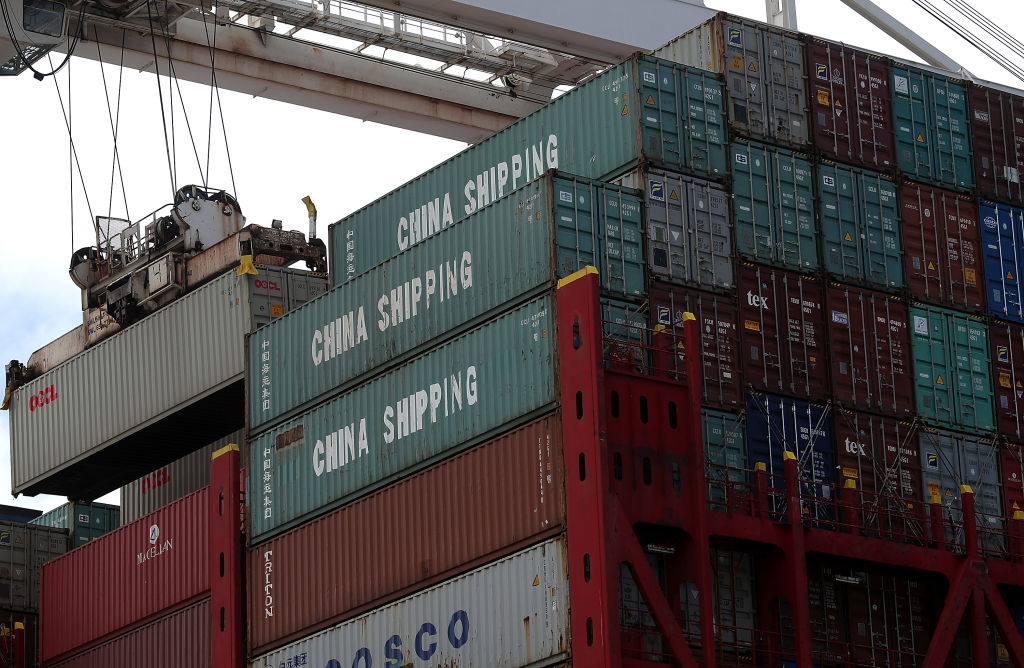
The Biden administration is nearing the end of a lengthy review on whether to adjust or extend tariffs on a variety of goods and materials from China—and the NAM is working to make sure manufacturers’ voices are heard.
The background: Following a 2017 investigation into China’s trade practices, the Trump administration put in place a set of levies on imported goods from China—called Section 301 tariffs—intended to incentivize change in practices by China that were found by the Office of the U.S. Trade Representative to be “unreasonable or discriminatory.”
- These included policies and practices related to technology transfer, intellectual property and innovation.
The review: In May 2022, USTR initiated a legally required four-year review of the Section 301 tariffs that focused on tariff efficacy in changing Chinese discriminatory practices and the impact of the tariffs on the U.S. economy, workers and consumers, among other considerations.
- More than 18 months later, the review remains unfinished. The NAM is urging USTR to finish and publish it—and to take actions that reduce the burdens on manufacturers while maintaining appropriate leverage to incentivize China to adhere to bilateral and multilateral commitments.
- “Ideally, USTR will conclude the four-year review in the next few weeks and make the results public,” said NAM Senior Director of International Policy Ali Aafedt. “We would like to see the results reflect the 1,498 public submissions USTR received during the process and the reduction or removal of some of the tariffs that are harming manufacturers in the U.S. more than they’re creating leverage on China.”
The exclusions: There are 429 existing exclusions from the tariffs—including 77 COVID-19-related products and 352 reinstated exclusions—which are in effect through May 31.
- The NAM has also been pushing for a new process that allows manufacturers to ask the government to exclude specific products they need from the tariffs.
- “The NAM has been calling for a new, fair and transparent Section 301 tariff exclusion process that would allow all U.S. stakeholders an opportunity to seek relief or weigh in on the existing tariffs,” said Aafedt. “The last opportunity to petition USTR for relief from Section 301 tariffs was in 2020, and a new exclusion process will help to better align the tariffs with U.S. economic goals.”
The outlook: Reports such as this one from The Wall Street Journal indicate that the Biden administration will look to rebalance the tariffs, potentially reducing those that are not in the U.S. interest and raising tariffs on other items, including, potentially, on imports from China in the electric vehicle and battery sectors.
- “The NAM will continue to push for a more strategic approach,” said Aafedt.
If your company has interest in a specific existing exclusion, USTR is seeking feedback here by Feb. 21.
